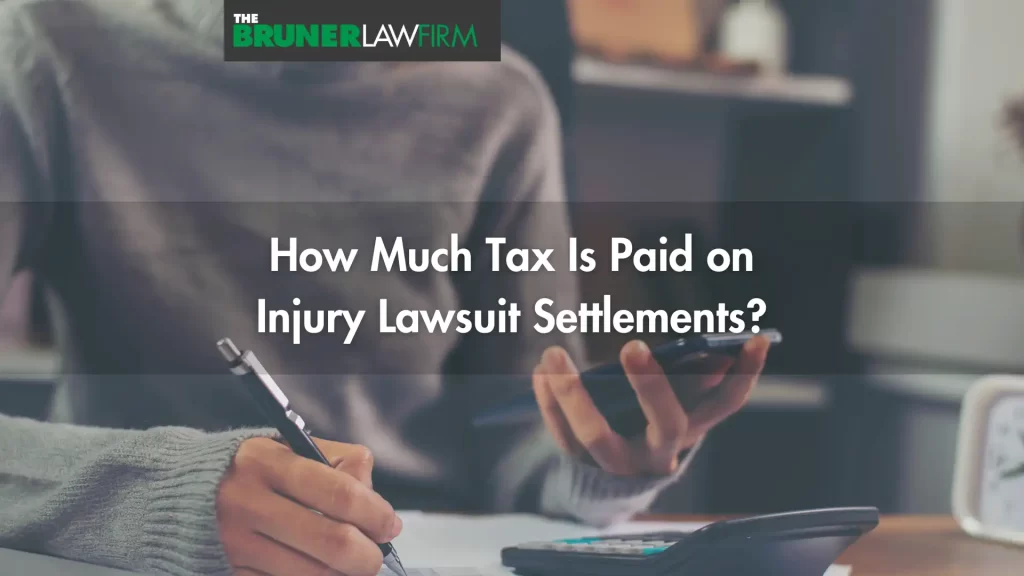
After going through an accident and fighting the insurance companies to obtain a settlement, the thought of paying taxes on your compensation is galling. The good news is that broadly speaking, you don’t have to pay taxes on personal injury settlements. Taxes are typically assessed on income, and the money from a settlement is not income in the traditional sense. Certain types of compensation from a personal injury settlement are taxable, though, and you don’t want any trouble from the IRS.
As experienced Florida personal injury attorneys, the team at The Bruner Law Firm has helped many people figure out the complex rules regarding settlement taxes. Our legal team can help you maximize your compensation for your injuries and structure your settlement to enable you to keep as much money as possible. Below, you’ll find more information on what taxes you must pay on personal injury settlements.
IRS Rules on Personal Injury Settlements
While Florida does not collect state income taxes, IRS guidelines provide a basic framework for determining what federal taxes you have to pay after winning a personal injury settlement. While every case and settlement is different, these are the broad rules regarding taxes on settlements:
Compensation for physical injuries
Generally speaking, the money you receive as compensation for bodily injuries is not taxable under IRS rules. So, any compensation you receive for things like your doctor’s appointments, prescription medications, physical therapy, transportation to appointments, and pain and suffering is not taxable. Furthermore, compensation for mental and emotional distress is not taxable if you have an accompanying physical injury. There is one big exception to this rule: If you took an itemized deduction for your medical bills in a year before you won your settlement, any compensation for medical bills might be taxable income.
Compensation for mental anguish without an accompanying physical injury
In some cases, plaintiffs in a personal injury lawsuit recover compensation for mental anguish unrelated to a physical injury. If your settlement includes this type of compensation, you might have to pay taxes on that portion.
Compensation for lost wages or other financial benefits
Many personal injury settlements in Florida include compensation for lost wages or reduced future earnings. This compensation might seem like income, but remember, the money from a personal injury settlement is meant to compensate you for past or future losses. Accordingly, you typically don’t pay taxes on compensation for lost income. (This rule only applies to personal injury settlements. Compensation for lost income is taxable in breach-of-contract suits, discrimination cases, and some other civil cases.)
Punitive damages
Punitive damages in a personal injury settlement work a bit differently, as their purpose is to punish the defendant, not compensate you for an existing loss. If you take your case to trial and win, any punitive damages included in your compensation is taxable income.
Interest on your settlement
It can take months or years before a personal injury case concludes, and even after you win, you might not receive your full settlement right away. In these circumstances, you might earn interest on your settlement, and that interest is taxable income. In some instances, you might acquire interest dating back to when you initially filed your claim. Make sure you account for any interest on your settlement and pay the appropriate taxes to avoid legal trouble.
Taxes on Confidential Settlements
While confidential settlements are not public, you still have to pay taxes on any qualifying compensation. If you don’t pay the appropriate taxes, you could find yourself in deep trouble with the IRS or other tax authorities.
Reporting Requirement for Personal Injury Settlements
 You don’t have to report all your money from a personal injury settlement, but you should report any portion of your settlement that qualifies as taxable income. The best way to avoid any problems with the IRS or another tax agency is to tell your attorney or tax preparer about all the money you receive from your settlement. They can determine what income you need to report and make sure you pay the proper taxes.
You don’t have to report all your money from a personal injury settlement, but you should report any portion of your settlement that qualifies as taxable income. The best way to avoid any problems with the IRS or another tax agency is to tell your attorney or tax preparer about all the money you receive from your settlement. They can determine what income you need to report and make sure you pay the proper taxes.
How We Can Help You Maximize Your Settlement
The way a settlement is structured can make a significant difference in what taxes you have to pay. Our experienced and dedicated attorneys can help you set up your settlement in a way that minimizes your tax burden. That way, you keep as much money as possible and have the resources to rebuild your life.
The team at The Bruner Law Firm knows figuring out what taxes you have to pay on your settlement is challenging, but we’re here to make this process simple and easy for you. Call (850) 243-2222 today or contact us online for a free case review.
Related Posts:







